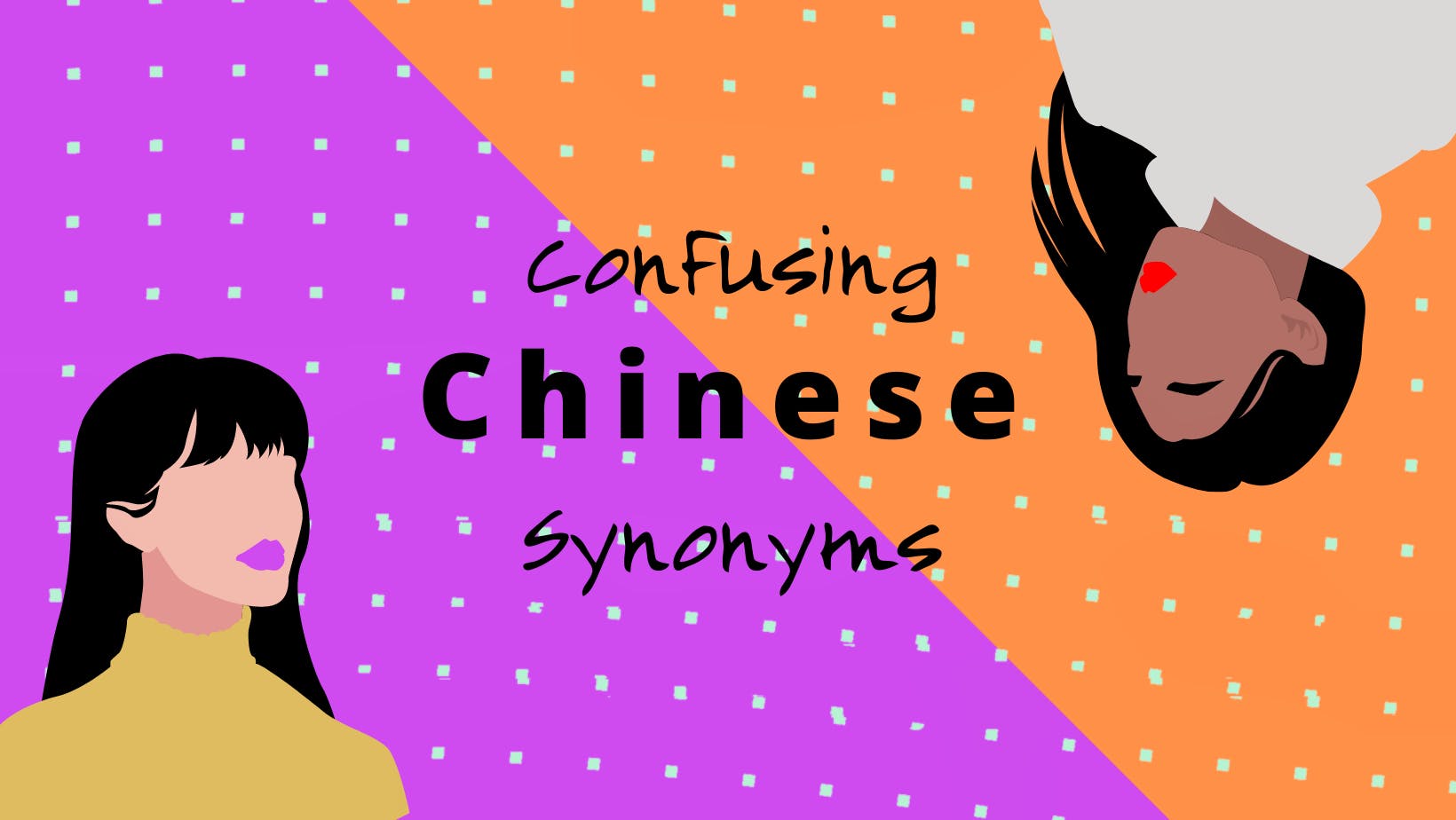Every language has synonyms. For those of us who study Chinese, choosing the right word in the right context can be a coin toss. Sometimes, there is no distinction between the English meanings, which makes the Chinese synonyms even more confusing!
Here are six word-pairs that we laowai often mix up, as well as how to use them properly:
原因 and 理由
(Reason)
原因 yuányīn means “cause; a condition that brings about a certain result, or accounts for a certain occurrence.”
我坐下来的原因是我累了。
Wǒ zuò xiàlái de yuányīn shì wǒ lèile.
The reason I sat down was because I was tired.
理由 lǐyóu means “ground; rationale.”
他没有理由说谎。
Tā méiyǒu lǐyóu shuōhuǎng.
He has no reason to lie.

目的 and 目标
(Goal)
目的 mùdì means “purpose; intention; end; place or realm to be reached.”
我学汉语的目的是为了跟中国人聊天儿。
Wǒ xué hànyǔ de mùdì shì wèile gēn zhōngguó rén liáotiāner.
My goal in studying Chinese is to chat with Chinese people.
目标 mùbiāo means “objective; target (of shooting, attack, etc.)”
我们这个月达到了销售目标。
Wǒmen zhège yuè dádàole xiāoshòu mùbiāo.
We reached our sales goal this month.

理解 and 了解
(To Understand)
理解 lǐjiě means “to know (a fact) clearly.”
她把我那句话的意思理解错了。
Tā bǎ wǒ nà jù huà de yìsi lǐjiě cuòle.
She misunderstood the meaning of what I said.
了解 liǎojiě means “to understand somebody or something (culture, communication methods, etc.)”
我朋友很了解我。
Wǒ péngyǒu hěn liǎojiě wǒ.
My friend understands me.

经历 and 经验
(Experience)
经历 jīnglì means “personal experience.” This can also be a verb, meaning “to personally go through; to undergo; to experience.”
他的经历很丰富。
Tā de jīnglì hěn fēngfù.
His experience is very rich.
他经历了两次车祸。
Tā jīnglìle liǎng cì chēhuò.
He experienced two car accidents.

经验 jīngyàn means “knowledge or skill attained through practice; anything observed or lived through.”
他有很多教学经验。
Tā yǒu hěnduō jiàoxué jīngyàn.
He has a lot of teaching experience.
表达 and 表示
(To express)
表达 means “to convey or voice (one’s feelings).”
我不知道怎么表达我对他的感激之情。
Wǒ bù zhīdào zěnme biǎodá wǒ duì tā de gǎnjī zhī qíng.
I don’t know how to express my gratitude to him.
表示 means “to show, indicate, or express with words or acts.”
他微笑着表示对我的欢迎。
Tā wéixiàozhe biǎoshì duì wǒ de huānyíng.
Smiling, he expressed welcome to me.

羡慕 and 嫉妒
(Jealous)
羡慕 xiànmù means “to admire; to envy”.
我羡慕你写得这么好。
Wǒ xiànmù nǐ xiě dé zhème hǎo.
I envy how well you write.
嫉妒 jídù means “to be jealous”.
马丁嫉妒玛丽上任了,因为他觉得玛丽比不上自己,那份工作应该属于他。
Mǎdīng jídù mǎlì shàngrènle, yīnwèi tā juédé mǎlì bǐ bù shàng zìjǐ, nà fèn gōngzuò yīnggāi shǔyú tā.
Martin is jealous of Mary’s promotion because he thinks Mary cannot compare to him, and he should have gotten the job.
A good tip to help you remember the difference is that 羡慕 is for good things other people have. 嫉妒is for things you think rightfully should be yours.

***This is a guest post on Chinese synonyms by Culture Yard Language School.
We dare say six pairs of Chinese synonyms are enough to make your head spin for now, but there are plenty more out there! What other tough Chinese synonyms have you come across during your studies?
Culture Yard Language School is an award-winning Chinese language school and cultural center that helps you learn Mandarin fast and efficiently. The language school was founded in 2009 and is located in the heart of old Beijing in China.
Culture Yard offers a variety of programs such as the HSK, Survival, Part-time and Intensive Chinese programs. Get your application started with China Admissions. Our professional student counselors will give you advice and guide you through the entire process.
- 5 Tips to Get a Scholarship in China this 2024? - February 15, 2024
- 3 Steps to a Great Personal Statement for a Chinese University 2024 - February 12, 2024
- 8 Apps To Learn Chinese Online For FREE in 2024 - January 31, 2024
